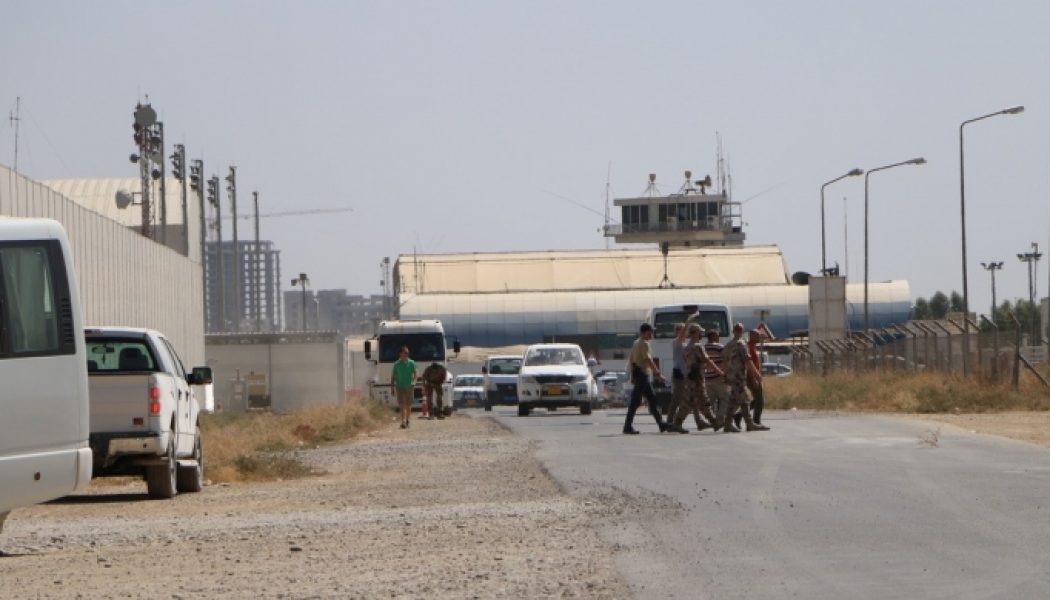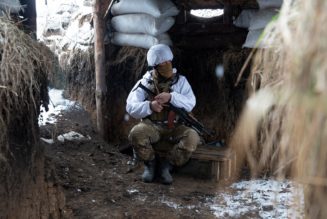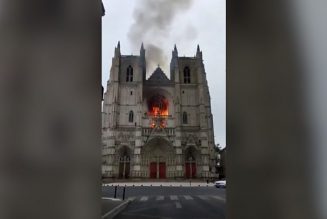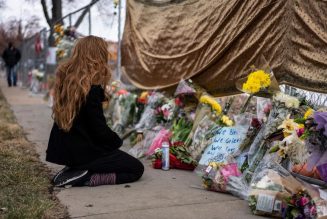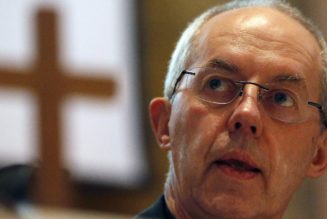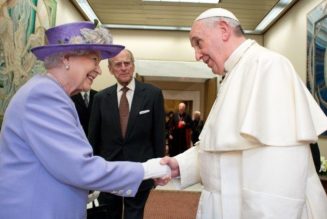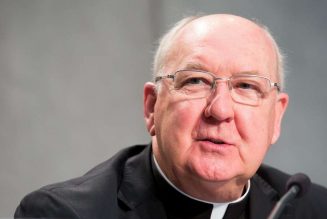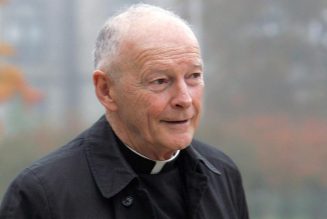
The Harir air base as seen on Sept. 21, 2016. (Edward Pentin photo)
The region, which was targeted by one of the pair of missile attacks launched yesterday as retaliation against the U.S., is home to several thousand Christians who have been trying to rebuild their lives.
ROME — Christians in northern Iraq are increasingly concerned about tensions in the region after Iranian forces launched five missiles overnight on an air base in the Iraqi Kurdish capital of Erbil that houses U.S.-led coalition troops.
The Nineveh Plain just north of Erbil is home to several thousand Christians who have been trying to rebuild their lives following the trauma of the Islamic State group (ISIS) occupying many once predominantly Christian towns north of the capital from 2014 to 2017.
Iraq’s military said the missiles struck the Harir air base located next to Erbil’s international airport. Another 17 missiles were launched on the larger Ain al-Asad air base in western Anbar province, 250 miles southwest of Erbil, also housing U.S.-led coalition troops. No casualties were reported.
The attacks were retaliation for the U.S. killing of the head of Iran’s special forces, Gen. Qasem Soleimani, on Jan. 3 during a visit to Baghdad. Soleimani had been personally sanctioned by the U.S. and the European Union, and the Trump administration had designated him a terrorist.
The assassination, carried out at the direction of President Donald Trump, followed attacks by supporters of an Iran-backed Iraqi Shiite militia on the American Embassy in Baghdad. The U.S. State Department said Soleimani had approved the attacks on the embassy that followed U.S. airstrikes in Iraq and Syria on Dec. 29 and had been planning further attacks on U.S. diplomats and military personnel.
Syriac Catholic priest Father Roni Salim Momika, a native of Qaraqosh 50 miles northwest of Erbil, told the Register the situation has become “very bad” since the assassination, adding that Iran is now threatening all Americans living in Iraq.
“Christians are very afraid” and are particularly concerned about “Americans using our lands for war,” he said.
“We’re afraid if something happens to the Christian places that Christians will leave,” Father Momika added. “We don’t want that; we returned after ISIS and were celebrating, reconstructing.”
Father Momika, who flew from Erbil airport last night to Lebanon just before the missile attacks began, said he spoke with some priests today in Erbil, in Ankawa (Erbil’s Christian suburb), and in Qaraqosh, who said that “they don’t know what to do because no one from the government is giving them information.”
“The Church is with the people, but we don’t know what Iran is thinking,” he added.
Although Iranian Supreme Leader Ayatollah Khamanei called the missile strikes a “crushing defeat,” reports say Iran gave prior notice of the strikes and the retaliation was carefully calibrated to satisfy outrage at home while preventing an escalation of the conflict.
Some in the region are therefore hoping that the reprisal will satisfy Iran’s need to react to Soleimani’s death and that tensions will now dissipate.
But the Harir air base is likely to remain a center of any continued tensions. Scaled down after the defeat of ISIS, it continues to be of strategic importance to the U.S. military and coalition forces.
In October, Delta Force commandos stationed at the base carried out an operation that led to the death of Abu Bakr al-Baghdadi, ISIS’ leader, and several military helicopters took off from the base to take part in the mission.
Some Iranian lawmakers see the base as a means for the U.S. to threaten Iraq’s neighboring countries, in particular Iran and Syria, but others see it as helping to guarantee stability in a volatile region plagued by Islamic extremism.
A number of Iranian-backed militias are present in the region, and the once predominantly Christian town of Bartella near Qaraqosh has become a center for the Shabak, a mainly Shiite Muslim militant group backed by Iran that has been intimidating the remaining Christians of the town.
Prayers Requested
Qaraqosh, however, has only Christian militias, namely the Nineveh Plain Protection Units (NPU), and residents therefore are relatively safer. Yohanna Yousif, a Syriac Catholic resident of the town, downplayed the situation.
“Don’t worry about the Christians in Nineveh Plain,” he told the Register Jan. 8. “Life is stable in all our villages.”
He said Christians living in Nineveh are “far from American bases,” and, because of that, he thinks “nothing will happen and people will stay in their homes.”
“We ask you to pray for Iraq,” he said.
But the situation generally remains unstable, and the security that Christians need to return and rebuild has again been dealt another blow.
“I heard yesterday that the Christians were terrified,” said Father Benedict Kiely, founder of the charity Nasarean.org, which helps persecuted Christians in the Middle East and who has visited the Nineveh region many times.
He said that “even if the attack on Soleimani and the others was righteous, the unintended consequence may well be the final nail in the coffin for the Christians on the Nineveh Plain who have barely recovered from ISIS.”
Father Momika said Christians are again thinking of leaving their homes but wondering where they would seek refuge if they did.
When ISIS invaded their towns in 2014, thousands of Christians fled to Erbil, but that is “dangerous now,” Father Momika said. “Where will we go? We’re not a small number. In Qaraqosh alone there are 27,000 Christians.”
“Our people want to start their lives again,” he continued. “We don’t want to lose all our people, and so we are asking for help to stop the war, to pray for our leaders, that they will solve everything as we want to live in peace.”
Edward Pentin is the Register’s Rome correspondent.
***
This evening Archbishop Bashar Warda of Erbil issued the following statement on the situation:
Statement from the Chaldean Archdiocese of Erbil, Kurdistan, Iraq
The current tensions between the two powers must not escalate. Iraq has been suffering from proxy wars for decades; they have torn our country apart.
We are a courageous people of hope. Since the defeat of ISIS in May 2017 by the coalition forces, our archdiocese has been working with other church leaders, Christian agencies, humanitarian agencies, governments and NGOs to help rebuild our fractured communities in Mosul and Nineveh Plain. It has been a very challenging road to raise funds and international support to help us to physically regain what we lost starting in August 2014.
The current tensions are threatening the serious fragility of the communities, which are tired of war and the tragic consequences of it. They have continually suffered far too much and can no longer face an unknown future. They need the certainty, reassurance, hope and the belief that Iraq can be a peaceful country to live in rather than being victims and endless collateral damage.
As Church leaders we will always follow the path of God in seeking peace, reconciliation, mutual dialogue and not conflict. His Beatitude Cardinal Sako, Patriarch of the Chaldean Church, rightly expresses the fears and anxieties of the people and their hope to be spared from the damage and tragedy of war. We are united in his call to prudently seek civilised dialogue and to pray for peace.
We seek the urgent action of the international community to use their influence to diffuse the tensions. Our prayer is for peace and that dialogue resulting in a just and peaceful outcome will be the path followed.
Archbishop Bashar WARDA CSsR
Chaldean Archbishop of Erbil
